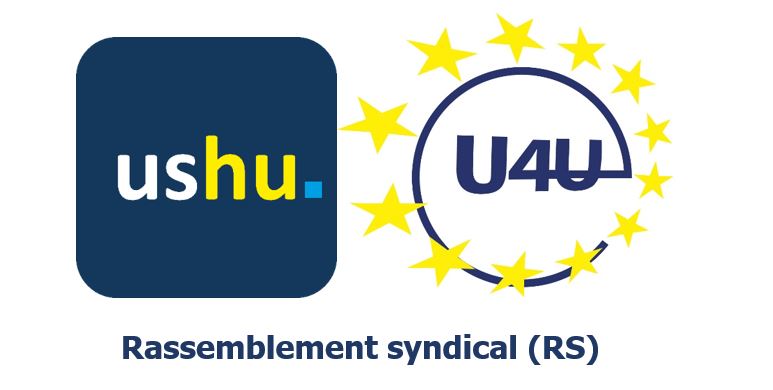Luxembourg location, enough is enough: the institutions must face up to their responsibilities

Staff working for the European institutions in Luxembourg are penalised by the higher cost of living in Luxembourg, even though they are paid the same as staff in Brussels. Everyone agrees on this, but none of the institutions is doing anything about it. All the trade unions deplore this attitude and call on the institutions to take action. It would have been better if all the unions in all the institutions had spoken with one voice. The time has come (see article on Budget 2024). An additional budget is currently being discussed by the Parliament, the Commission and the Council. If the Commission’s proposal for an additional one and a half billion euros for heading 7 (operating budget) is accepted, the situation for staff in Luxembourg could change for the better.
Any adults in the room? Stop fooling us!
United Front Communication
As we all know:
- The salaries in Luxembourg are the same as in Brussels, this is enshrined in article 64 of the Staff Regulations
- The accumulated purchasing power gap between these two worksites started to build decades ago (1). It is today probably close to or even above 20%. The salary adaptation in December, negative for some colleagues and close to zero for most despite high inflation contributes even further.
- The main element affecting Luxembourg-based staff, beyond this purchasing power gap, is the relatively higher cost of living in Luxembourg mainly (but not only) linked to accommodation costs. Let’s also mention the excessive medical costs.
- The institutions based in Luxembourg, after more than 20 years of gap building, finally issued in 2022 a plan of 12 actions (2) to enhance the attractiveness of Luxembourg as a place to live and work.
- The situation in the Commission services is dear: chronic understaffing, rising numbers of empty posts, rising usage of Contract and Temporary Agents vs decreasing numbers of Officials, rising usage of private service providers, who may or may not fulfil the requirements and overall, a diminishing number of posts being effectively attached to Luxembourg.
- For Luxembourg-based colleagues, there is an increasing proportion of them commuting across the border and also an increasing proportion of them taking any opportunity to get another job elsewhere. Incapacity to attract or retain staff and growing issues with delivering the tasks are facts.
- The trendy ‘geographical balance’ across sites that the Commission wishes to reach is locally getting further and further away. Indeed, the proportion of some nationalities is growing while other nationalities are locally close to extinction.
- Last but not least, for the colleagues who are lower on the salary scales: minimum-national-salary-compensation mechanisms exist in various Luxembourg-based EU institutions. Each institution as its own and provide different compensations for the same situation. These compensation differences, let’s say for a given grade, are now even farther creating competition between institutions. Indeed, the Parliament decided to amend its own minimum-wage rule in summer 2023 to make it much more advantageous than before. The Commission compensation mechanism was also always the ‘least attractive’ one. It is even more so now.
For the last few years DG HR repeatedly stated they were working with other institutions on a housing allowance as an income-compensation mechanism. The claimed reason for not yet having implemented it was due, of course, to budget constraints. The latest information indicates that the housing allowance for Luxembourg is no longer even on the agenda. That decision has obviously been taken without any consultation with the trade Unions or your elected staff representation (Local or Central Staff Committee). This seems to be yet another example of the total lack of formal discussions (‘social dialogue’).
- What will the Luxembourg-based institutions propose instead of a housing allowance?
- Is the decision of not using a housing allowance or any other compensation mechanism (let alone the one for colleagues under the minimum national salary) again linked to budget constraints?
- Is the decision to abandon a housing allowance just a way to again win a bit more time as our employer does not have any decent durable solution to the cost-of-living problem in Luxembourg?
- Is our Commission College (like the previous ones) trying to avoid its responsibilities towards staff?
This looks like a crooked tango where partners (employer and employees) never look in the same direction and, of course, don’t really listen to each other. In a dysfunctional couple, at some stage one party must admit that it wants a divorce. The couple conciliation (the 12-action plan to enhance the attractiveness of the Luxembourg EU institutions as a place to work) was set up to fail. Why isn’t the Commission just admitting that the Luxembourg Commission site will close down? Do Commission staff in Luxembourg need to go to the street to be heard and considered?
The undersigned trade Unions and staff associations and, through them, their overarching Representative Unions Federations at Commission level call for an immediate Social Dialogue on the attractiveness of Luxembourg as a place to live and work and a dedicated meeting with Commissioner Hahn.
- AIRINC 2019 REPORT REFERENCES study-cost-of -living-eu-staff-luxembourg-final-report-26-09-2019.pdf (europa.eu)
- 12 actions for Luxembourg: 12 actions
2024 budget : Largely insufficient agreement

Largely insufficient agreement and mid-term review of Multiannual Financial Framework (MFF) still not adopted
On 10 November, the European Parliament and the Council adopted the European budget for 2024. This budget will make it possible to respond in part to the more urgent needs of the European Union and its neighbours, as well as to the consequences of the crisis in the Middle East. However, the mid-term review of the MFF is urgently needed and the outlook for the coming years remains bleak, especially for heading 7, which was cut at the beginning of the Commission’s mandate on its own proposal.
We are delighted that the 2024 budget was approved during a conciliation procedure between the European Parliament and the Council. For 2020, the agreement provides for €189.4 billion in commitments and €142.6 billion in payments. This will allow the budget to continue to support the recovery of the European economy through its various programmes, to finance needs arising from geopolitical tensions, notably in Ukraine and the Middle East, and to ensure the functioning of the European institutions.
However, this budget remains insufficient to meet the financial needs of the European Union for three main reasons.
First, it does not allow our institutions to function properly in the face of geopolitical crises. The budgetary authority has taken a restrictive approach in line with the Council’s position, leaving the EEAS underfunded by €114 million without additional staff, and the budgetary situation in 2024 is likely to be complicated.
Second, the revision of the multiannual financial framework proposed by the Commission in June 2023 has still not been adopted. These new resources are needed to address urgent needs that cannot be met within the ceilings of the current MFF. In particular, the EU needs to be given the resources to deal with the consequences of Russian aggression in Ukraine, migratory pressures, responses to natural disasters and the need for critical technologies to guarantee its strategic autonomy.
This also means that Heading 7 (Administration), for which an additional allocation of 1.9 billion was foreseen, is likely to exceed the financial ceiling as a result of the automatic application of the method. This amount is necessary because 2.5 billion was cut at the beginning of the Commission’s mandate. This withdrawal deprived it of any room for manoeuvre to deal with new tasks, in a context of inflation. As a result, additional budgetary resources will be sought through the planned sale of the Commission’s 23 buildings.
Finally, the budgetary outlook beyond 2024 remains very worrying. The European Commission will have to make interest payments on the joint loan contracted with the financial markets to finance the Recovery and Resilience Plan (Next Generation EU). The special instruments have already been used to the maximum and the remaining margins are very small, around less than €1bn. Given the rise in interest rates and the relative reluctance of Member States to increase public debt, the European budget for 2025 will therefore be an austerity budget, which could lead to cuts in all areas, including administrative expenditure.
U4U insists that the Commission and the European Parliament fight to ensure that the very modest proposal for the revision of the multiannual financial framework presented by the Commission in June 2023 is adopted without any cuts.
Meeting between U4U and the EUIPO: the continuation of the cooperation

Joint press release
On 28 November, the Executive Director of the Office welcomed Mr Georges Vlandas, President of the Union for Unity (U4U) – the European and civic trade union for all staff of the institutions, Ms Annabelle Menéndez Vallina, U4U coordinator, and Mr Gregor Schneider, U4U Vice-President and President of the AASC network (Assembly of Agency Staff Committees), for a first meeting to exchange views on staff policy at the EUIPO and the objectives of the EU institutions and agencies, in particular as regards the management of human and budgetary resources.
Over the past years, the Office has established regular exchanges with U4U via a memorandum of understanding that was signed in 2016. These exchanges provide a beneficial complement to the regular social dialogue maintained with the Staff Committee of the Office.
In the course of the fruitful exchange, U4U commended the achievements of the Office to date and expressed their wish to build a solid rapport, based on sharing of knowledge and experience, based also on the trust that social dialogue and discussing different positions will always increase the quality of administration.
The ED also shared his willingness to establish a constructive dialogue and informed U4U of the open consultation for the new Strategic plan and his readiness to hold a candid conversation on the different pillars of the staff policy once the possibilities are identified.
Several topics were discussed in this context with both parties agreeing on the importance of a flexible, diverse and modern staff policy with a view to attracting and retaining talent, notably with regards to younger generations.
In conclusion, both the ED and U4U agreed upon their mutual interest in establishing a collaborative future relation, respecting the roles of each party, in the best interest of the Office and it’s staff.
Improving selection and recruitment procedures

Why an active and constructive social dialogue is needed to improve selection and recruitment procedures in the European civil service ?
Speech by Georges Vlandas on 11th Dec 2023 trade unions’ seminar on EPSO selection procedures
The first guarantee of an efficient, agile and innovative European civil service is the quality of the selection and recruitment process put in place by the Institutions.
Despite that, selection and recruitment in the European institutions are in crisis, and not a week passes without EPSO, the body responsible for selecting staff, receiving some very severe and varied criticism, even from the institutions themselves.
This crisis affects us in many ways.
- Firstly, the candidates themselves are being badly treated.
- Second, the departments cannot obtain the additional human resources needed to perform their function.
- Next, there are concerns about the validity and reliability of our recruitment and selection procedures.
- The proportion of permanent official staff is decreasing while that of the contract and temporary staff is increasing.
- Finally, this reflects badly on the Commission’s image, not only in relation to other institutions, but also and, above all, in relation to European society as a whole.
The situation is sufficiently concerning that the search for solutions needs a robust collaborative assessment of the various malfunctions in the selection and recruitment procedures.
And this is what our present meeting aims to contribute to.
To mention the most important of these:
– procedures that take too long and therefore fail to attract new talent;
– invalid and unreliable selection tests that fail to recruit the staff we need;
– the time lag between recruitment procedures and job offers;
– issues related to multi-lingualism.
For a new perspective on the content, selection process and nature of competitions, we need an active social dialogue involving all stakeholders – staff representatives, DG HR, EPSO management, including the other Institutions. We also need a broader consultation involving other stakeholders, including those from civil society, such as. former candidates, recruitment and selection experts, and so on.
The challenge is to formulate a new selection and recruitment policy that will attract and recruit the competent motivated European staff of diverse talent that we need.
This future recruitment process would mainly take the traditional, but revised, form of external competitive examinations and the parallel recruitment of contract or temporary staff, with the option of their permanent integration into the European civil service through internal competitive examinations or ad hoc assessment procedures. The future of our European civil service is at stake.
Guidelines for the use of social networks: what freedom of expression ?

On 7 November, DG HR and DG COMM held an information session on the new Social Networking Guidelines, which set out the rules of application for Commission officials and staff. The document, which was adopted without proper consultation of the trade unions, sets limits on freedom of expression and promotes as good practice that we should be “ambassadors” for the Commission. In its memorandum of 27 July, the Central Staff Committee raised questions about the impact of the guidelines on Commission staff, including staff representatives. However, the memorandum went unheeded.
The guidelines have been in place since 2011, with successive updates in 2018 and 2023. In the current version, changes have been made regarding the inclusion of trainees in the scope of application, the obligation to declare as an external activity the management and publication of information in blogs, podcasts and other channels such as YouTube, as well as security and data protection aspects. It should also be stressed that the context has changed considerably, in particular with the increasing use of social networks for disinformation and the dissemination of false information. This also raises ethical issues that cannot be ignored.
The general legal framework, as set out in the Staff Regulations, the case law of the Court of Justice and current administrative practice, establishes that freedom of expression is not absolute, but is regulated and subject to different degrees of restriction depending on whether it is exercised internally or externally.
As regards the internal freedom of expression of officials and other staff, a number of situations need to be distinguished. Members of the Staff Committee enjoy a very high degree of freedom of expression, including criticism of the administration, when speaking on matters within their competence (Article 9 of the Staff Regulations). Trade union representatives, when speaking on matters within their competence (Article 24 of the Staff Regulations), enjoy legal protection by virtue of the freedom of association recognised by the framework agreement governing relations between the European Commission and the representative trade union organisations. Finally, Commission staff are bound by the duty of loyalty (Article 12 of the Staff Regulations), impartiality and respect for the dignity of their office. As such, they do not enjoy complete freedom of expression and may therefore be subject to disciplinary action. In principle, officials and other staff may criticise internal policies, but there is no absolute freedom. On the other hand, when the Commission asks staff for their opinion on management issues through internal platforms (“Have your Say” or Yammer, replaced by Viva Engage), for example on the implementation of hybrid working, criticism is tolerated.
With regard to the external freedom of expression of officials and other servants, the guidelines strictly define the scope of application for aspects relating to the activities of the European Union, including personnel policy. The principles are as follows: the freedom of expression of officials and other servants is subject to the principle of loyalty and impartiality; the expression of officials and other servants is subject to prior authorisation by the administration; prior authorisation is guaranteed when officials and other servants express themselves in their capacity as ambassadors of the Commission; officials and other servants may express divergent positions provided that they have notified the administration; otherwise, protection from possible disciplinary proceedings cannot be guaranteed.
In such cases, a balance must be struck between freedom of expression and the principle of loyalty. In this respect, the Court of Justice has stated that staff must have freedom of expression, but also the obligation to inform the Commission in advance in order to assess the risk[1]. In addition, critical views on the Commission’s activities must not harm the institution (duty of loyalty). It should be noted that there is no difference in protection between staff representatives and other staff when it comes to communicating on the activities of the European Commission, which falls short of the rights enjoyed by trade unions in some Member States. For its part, DG HR insists that ‘retweeting’ the Commission’s official positions is the safest way to communicate, but is it attractive?
U4U believes that the guidelines, while setting out legal principles and normative values, should be further clarified, particularly with regard to the demarcation between the professional and private spheres in the use of social networks. Does the publication of critical but resolutely pro-European content on a social network violate the duty of loyalty? Should we not define more clearly the consequences in terms of disciplinary action against staff for communications deemed inappropriate? Is it reasonable to notify “sensitive” publications on social networks at every opportunity, given that the administration does not have the capacity to deal with all these requests, which would place a bureaucratic burden on its staff? Wouldn’t it be better to promote a positive approach to communication by officials and civil servants in a responsible and fair way? Wouldn’t the Commission also be well advised to provide staff and their representatives with the language they need to defend the civil service?
These are all questions that deserve in-depth discussion with staff. The administration needs to decide whether it prefers a disciplined staff, adept at “retweeting” on social networks, or a modern, efficient, responsible and intelligent civil service.
[1] Connelly and Cwick cases-law eur-lex.europa.eu/legal-content/FR/TXT/PDF/?uri=CELEX:61999CJ0274 – Court of Justice of the European Union – Judgment of 13 December 2001 in case n° C-340/00 P – Strada lex)
Participative leadership in the vocabulary of the European institutions – We tell you more !

Given the increasing complexity of the challenges facing the European Commission and the need to do more with less, a change has been underway for several years: Participative Leadership (PL), which involves a move away from top-down management towards collaborative decision-making.
PL fosters collective intelligence by encouraging a diversity of views and expertise. Through open dialogue and collaboration, it harnesses the collective knowledge of its diverse workforce, enabling more informed decisions and innovative solutions to complex problems, rather than relying solely on hierarchical decisions.
This approach strengthens the overall intelligence of the organisation by drawing on the experiences and viewpoints of colleagues from different departments and backgrounds.
The challenge is to create meaningful conversations based on the following key elements to facilitate dialogues that go beyond the simple exchange of information:
1. Build trust: Create an environment where team members feel comfortable sharing their thoughts, ideas and concerns openly, demonstrating transparency, reliability and support..
2. Active listening: individuals are genuinely attentive to the perspectives of others and actively seek to understand different points of view and experiences.
3Constructive dialogue: Conversations focus on constructive problem solving and idea generation with the aim of finding solutions that benefit the community.
4. Inclusion: all participants, regardless of their position within the institution, are encouraged to contribute, ensuring a diversity of backgrounds, experiences and points of view, fostering a sense of belonging among team members and recognising the strength that this diversity brings to decision making.
5. Respectful communication: Interactions are characterised by respect, courtesy and recognition of the value that each person brings to the conversation.
6. Depth of understanding: Participants seek a deeper understanding of the reasons and motivations behind ideas and opinions, which facilitates more informed decision-making. It can also be interesting to ask questions that stimulate critical thinking and create a culture that values curiosity and continuous learning.
7. Empathy: recognising the feelings and experiences of others, fostering a culture of empathy and support within the team.
8. Focus on solutions: When discussing challenges, the focus is on finding solutions together, rather than just focusing on the problems.
The LP approach encourages and empowers team members to take ownership of their work and make a significant contribution to the institution’s objectives.
Of course, changing an organisation’s culture to value and promote LP takes time and commitment, and presents a number of challenges.
Some colleagues may be reluctant to move away from traditional hierarchical structures, making it difficult to adopt more participative approaches. We also find that language barriers or multiple communication channels can hinder the exchange of ideas and collaboration. Ensuring that all voices are heard and taken into account can be difficult, particularly in organisations of our size. On the other hand, it is important to strike a balance between inclusion and efficiency. Reaching consensus in participative processes can take longer than in traditional top-down decision-making, which can affect the speed with which decisions are implemented. Staff may need training to develop the skills needed for effective collaboration, communication, and conflict resolution in a participative environment. Seminars and training have been provided by DG HR, which has also encouraged the creation of a community of practice to provide support at inter-institutional level.
The hybrid working model can pose additional problems
The use of digital communication tools could potentially hinder the spontaneous and informal interactions that are crucial to the LP. Technical difficulties could be an obstacle to the smooth running of participatory processes.
When it comes to inclusiveness, it is important to ensure that remote and in-office colleagues have equal opportunities to participate in decision-making processes, as physical presence can unintentionally influence participation.
Building and maintaining trust between team members is essential to the LP. The physical distance that exists in hybrid work systems can make it more difficult to build and maintain trust between team members. Similarly, spontaneous collaboration and the sharing of ideas can be limited in hybrid environments, affecting the dynamic and interactive nature of the LP.
To meet these challenges, departments need to establish clear policies for virtual collaboration and foster a culture that values and supports participative practices, regardless of the physical location of employees. In addition, managers need to be proactive in ensuring that team members, whether remote or in the office, feel equally included and engaged in decision-making processes.
Tackling these challenges requires a strategic and patient approach that focuses on the long-term benefits of improved collaboration, innovation and employee engagement.
Preconceived ideas about participative leadership
- Lack of decision-making: Some people may mistakenly think that LP is synonymous with a lack of decisive action. It is about taking decisions in collaboration with the various stakeholders.
- Equal participation in all decisions: not all decisions require the same level of participation. LP involves recognising when broad collaboration is needed and when more streamlined decision making is appropriate.
- A process that takes time: while participatory approaches may take longer for certain decisions, this does not mean that every decision requires in-depth consultation. An effective participatory approach combines inclusiveness and efficiency.
- Removing hierarchy: LP does not necessarily mean the removal of all hierarchical structures. It implies a more inclusive and collaborative style of leadership within existing structures.
- Achieving full consensus: Achieving full consensus in a participatory decision-making process is a real challenge. It involves gathering diverse information, understanding viewpoints, and making informed decisions that benefit the community.
- Misinterpretation of data: Managers must avoid misinterpreting participatory input. It is not just a matter of collecting ideas, but of understanding and genuinely integrating different perspectives into the decision-making process.
Clear communication and training are essential to dispel these misconceptions and ensure effective implementation of LP in institutions.
We are increasingly being asked to participate in surveys. What role do they play in the LP?
While surveys can gather valuable data and opinions, they are not inherently LP methods. Surveys typically involve one-way communication, with participants answering pre-defined questions. This is at odds with the interactive and dynamic nature of LP, which encourages ongoing dialogue and collaboration.
LP emphasises collective decision-making and collaboration, whereas surveys often involve individuals responding independently, without participating in group discussions or shared decision-making processes.
Surveys have a predetermined set of questions, which limits the flexibility to explore different perspectives or adapt the survey according to ideas that emerge during the process, which is a key aspect of LP.
Surveys may lack the depth needed to fully understand the context or underlying reasons for participants’ responses. LP often involves exploring these nuances through open dialogue.
Surveys can be open to misinterpretation as respondents may have different interpretations of the questions. LP aims to reach a common understanding through ongoing conversation and clarification.
LP emphasises empathy and understanding between team members. Surveys, being a more detached method, may miss the opportunity to develop empathy through direct interaction and sharing of experiences.
While surveys have their place in quantitative data collection, participatory learning methods often involve more qualitative, interactive, and continuous approaches that go beyond the structured nature of surveys. Effective learning by doing involves ongoing dialogue, active listening and collective exploration of ideas and solutions.
We wanted to address the issue of participative leadership because it is in line with U4U’s values, such as the holistic approach to our professions, inclusion, and societal, social, and cognitive diversity. Let’s all play an active role in the European project, let’s contribute by being who we are, every day.
Telework: a source of productivity and well-being for workers? Let’s discuss it.

In the wake of the health crisis and the ensuing lockdown, a new way of working has emerged: hybrid working, where remote and face-to-face working are now part of our daily routine.
According to the results of the evaluation of the implementation of the Commission’s decision on working time and hybrid working, published last November, staff and management on the whole appreciate the changes and the flexibility of working conditions. However, the relatively small number of people who took part in the survey means that we have to put the significance of this result into perspective. Similarly, we do not yet know the reasons for the negative opinions.
This evaluation of the decision showed, according to DG HR, that “work productivity has been maintained, while the new working conditions have improved the work-life balance and reduced various types of leave and part-time work”. The evaluation concluded that staff had achieved an appropriate balance between office work and telework, with an average of 54% of working time spent in the office. (for more details, see article …).
This new way of working is giving rise to a great deal of debate and deserves to be examined in greater depth, with reference to the existing literature on the subject.
On 26 October, Claudia Senik, Professor at the Sorbonne University and the Paris School of Economics (PSE), gave one of our GRASPE presentations entitled “Is teleworking good for employee well-being?
His presentation, based on a large number of studies and surveys, raised a number of open questions that have already provided some food for thought.
Here is an overview of the conference:
- Effective” rate of office and home working
American studies have shown that office occupancy rates in the United States today (in October 2023) are only 50% of what they were pre-Covid: on average, only half of office space is occupied. But today we are seeing a kind of attempt to turn back the clock by employers who are trying to get their people back into the office – because, after all, there are some drawbacks to telecommuting. For example, Zoom itself, the largest remote communications provider, has decided that all of its employees who live less than 50 miles from the office must now return to the office at least twice a week. So there is a tension between what employees want or do and what employers want.
The Global Survey of Working Conditions, an online survey of workers and employers in 34 countries between April and May 2023 found that a quarter of working days are spent remotely, and a third of workers work from home some or all of the time.
More specifically:
- 67% still work five days a week on site,
- 26% have a hybrid arrangement and 8% work full-time from home. It should be noted that this result varies from country to country: the level of homeworking is higher in English-speaking countries.
The result is that, globally, employees would like to work remotely two days a week and employers would like to let employees work remotely one day a week.
In every country, there is a one-day gap between what employees want and what employers want.
- Main advantages of working in the office and at home
| Advantages of working in an office | Benefits of working from home |
| Socialising with colleagues | No journey |
| Clearer boundaries between work and personal time | Saving on transport and meal costs |
| Best facilities/equipment | More flexibility to organise your day |
| Save time | |
| More time for yourself, family and friends |
The benefits highlighted are essentially those relating to self-organisation and life in general, rather than work itself, which may explain why there is ultimately this difference between what employees want and what employers want.
However, the authors found that:
- People work fewer hours on days when they are at home. On average, they work 80 minutes less on days when they are at home. On the other hand, they work more hours on days when they are in the office and at weekends.
- People who benefit from working from home say it’s convenient because they can go to the dentist, pick up their children from school, play sports, etc.
- Even when they are in the office, teleworkers communicate more by individual messages: telework has accustomed people to a synchronous style of communication (I send a message when it suits me, I reply to a message when it suits me, etc.).
The argument of saving travel time wins the day.
Virtual communication is a real and lasting change brought about by teleworking.
- Links between telework and well-being
Field experiments on whether or not employees choose to telework have shown that, on average, people – especially the most skilled and those with long commutes – would be prepared to accept an 8% pay cut for the opportunity to telework.
These experiments showed that workers who were given the opportunity to work in a hybrid way did not lose productivity, were more satisfied with their jobs and had 35% fewer resignations than those who continued to come into the office.
On the basis of this local experience, the hybrid working proposal was then generalised to all the companies concerned for those whose work is more naturally done remotely or who are more accustomed to self-organisation.
As for the possibility of being forced to return to the office, a quarter of employees worldwide who already telework said they would quit their job if their employer forced them to return to the office 5 days a week.
The conclusion was that teleworkers reported much higher levels of happiness at work and the resignation rate was halved: allowing people to work from home increases their happiness and their chances of being retained.
However, it is important to emphasise individual heterogeneity: not everyone appreciates the opportunity to work from home in the same way. There are sometimes imperceptible differences between people, characteristics that depend on the individual and not on whether they telework or not.
- Does teleworking make workers “happy”?
- Identifying sources of well-being at work :
- – Autonomy. Freedom is a factor in well-being at work: people are generally happier in small units, or at least when the chain is less hierarchical and long, when they can decide more about how they do things.
- – Work-life balance
- On the face of it, teleworking is a good thing because it means you can pick up your kids from school and so on. But in practice, we’ve found that it creates a porous gap between work and home life, which is a source of tension, particularly for women, for whom telecommuting and working from home are not a factor in increased well-being.
- However, women are still more likely to want to telework than men. They still bear the brunt of the family burden. All the studies show that when women work from home, there is a negative impact on their mental health. There is no reason why women should want to telework more than men. Unless teleworking is an indicator of the division of labour between men and women…
- – Social capital, i.e. the quality of relationships within the group.
- Exchanges between colleagues are not necessarily bilateral, they can also be multilateral (can I ask someone for a favour, can they ask me for information, do we have exchanges, cooperative services, etc.).
- People help each other: this is what we call social capital. But it takes time for trust to develop, for cooperative behaviour to take root and for information to be exchanged. It’s only by “working together” that we get to know each other and even anticipate people’s reactions in unforeseen situations much more easily, without having to send each other millions of messages. It is true, however, that for some people, if social relations in the office are uncomfortable or bad, working remotely eases tensions: it can work both ways.
- – Prospects for progress.
- Employees have expectations and live in anticipation of what will happen in the future. Prospects for advancement in terms of responsibilities, promotions, etc. are therefore more complex to manage when working remotely. Being further away from the decision-making centre, you have less understanding of the perspectives set by the hierarchy, which is not necessarily a good thing.
- – The question of the meaning of work.
- The fact that I’m not on site somewhat reduces my identity at work (Does what I’m doing make sense? Does the company have a good impact and do I like it? Is there a congruence between my values and those of my employer? Is my identity at work strong? )
- To have a real identity at work, the worker needs a set, costumes, a scenario, and this only happens when we are in real presence with each other (cf. Erwin Goffman, sociologist).
- Identifying psychosocial risks and ill-health:
- – Longer working hours
- Eliminating the need to commute is obviously a good thing, but working remotely means that working hours can be longer and less synchronised, which can be a destabilising factor.
- – Less support from colleagues
- – Mixing personal and professional life
- This mix has given rise to the term ‘technostress’, which refers to an overload of work where you don’t know whether you’re working or not. You are never able to escape the demands of your work, which can lead to tension and stress.
All these channels can be activated or deactivated in a positive way: the sources of well-being at work are in the office and the sources of balance are at home. So we lose something of the office life when we stay at home: that would be social capital, i.e. interactions with others, the feeling of belonging to a cooperative group and being aware of all the information that is circulating…
This loss of social capital can lead to a sense of destabilisation.
- Is there an optimal solution for implementing teleworking?
If teleworking offered all the advantages of autonomy and real interaction with the group, it could indeed be a good solution.
From an individual point of view, teleworking seems ideal: I come to work when I want, and when I do, I can see colleagues, exchange ideas, take part in seminars and so on.
But let’s not forget that individual actions come together and need to be coordinated: if I come to the office and nobody is there, it makes no sense, except in terms of logistics and material comfort if the home is less suitable than the office.
So how do you coordinate workers so that they are all there at the same time?
- If the employer has a large number of employees working in teams, they may decide that the whole team must be present on certain days.
- But if the employer has fewer employees, this means that some days the offices will be empty, which raises the question of premises, unless a rotation system is put in place.
- We also need to consider whether workers should be allowed to decide when they come into the office.
Employers will need to find solutions to these coordination problems.
- Conclusion
The standard question is life satisfaction.
The confinement that has brought workers to full teleworking has had a negative impact on their life satisfaction and mental health. In particular, difficulties with concentration and feelings of uselessness were observed, especially among mothers of school-age children. In general, there was a negative effect in these two areas.
On the other hand, there were no negative effects for employees who teleworked part time. So it’s the whole thing that’s harmful.
There are positive and negative aspects to teleworking. Employees want to telework, at least part-time. Employers would rather give them a bit less. But when they telework all the time, employees are unhappy. As we have seen, these feelings are due to the advantages and disadvantages of telework, with the risk that the latter will take over.
We will have to pay attention to all these issues. We are navigating between different traps.
These open questions are the responsibility of managers, but it’s also up to all of us, the workers, to come up with ideas.
Evaluation of the implementation of the decision on working time and hybrid work

A positive report overall, but adjustments are needed and some questions remain unanswered
The report on the implementation of the decision on working time and hybrid work was finally published on 15 November, well after the planned deadline (end of September). Overall, it concludes that staff are generally satisfied with the current arrangements, although some adjustments may be necessary. It also suggests, within the limits of the data available, that hybrid working arrangements have had a positive impact, particularly on productivity, work-life balance and absenteeism. However, the report is silent on important issues such as the right to rest, staff well-being and the collective functioning of teams. Nothing said about quality of work.
The evaluation work, carried out by an internal DG HR team, was based on the analysis of data collected from pulse surveys, 13 target groups (staff, managers, HR correspondents), internal sources (Sysper) and the various opinions of the statutory committees. The report contains a great deal of information, although there are some gaps, particularly in terms of the level of detail required (by DG/unit, function, type of work, gender) and the relatively limited period for data collection (April 2022-March 2023). In addition, the evaluation methodology includes a benchmarking exercise on the rules and practices in place in other European and international institutions. The details of this exercise have not been made public, but more importantly, in line with good international evaluation practice, it would have been prudent to have used independent experts and to have drawn on the work of specialised institutes and bodies, in particular the work of Eurofound.
Based on the results of the evaluation, DG HR considers that “the implementation of the Commission Decision on working time and hybrid work is generally working well, although some adjustments need to be made. It provides reasonable assurance that the provisions of the Decision are being complied with and that the general objectives of the Decision are being achieved”. In particular, the evaluation, based on data from the pulse survey carried out in February 2023, found a very high level of satisfaction (83%) with hybrid working conditions, although this result should be put into perspective as around 40% of staff responded to the survey. This raises the question of the significance of this level of participation, but in particular of the proportion of staff (10%) who responded negatively on the basis of their own experience.
The report also highlights an improved work-life balance and a positive impact on CO2 emissions by limiting daily travel and office space, which helps to reduce energy consumption. DG HR emphasises that the majority of staff have benefited fairly from the implementation of the decision, while acknowledging that efforts are still needed to adapt the DGs to their specific needs.
However, the evaluation does not address issues that are essential for a proper understanding of the extent of the changes brought about by the organisation of hybrid work. Firstly, the issue of productivity is not directly addressed, although it is mentioned that hybrid work is a potential source of efficiency in the absence of empirical data. But what about the quality of work if it is not captured by managers’ perceptions? And what about team cohesion and its essential corollary, the transfer and sharing of knowledge, which we all agree has been adversely affected by the spread of hybrid working? Productivity, which is difficult to measure in public administrations, is certainly a different concept from work intensity, which means that working hours are extended beyond the 40-hour week due to the increased working rhythms to which most Commission staff are subjected. It is regrettable that these dimensions, which are inherent in hybrid working, have not been studied in depth.
Secondly, the evaluation report does not examine the application of the right to disconnect, on which the European Parliament’s resolution of 21 January 2021 made recommendations to the Commission. Several committees have stressed the importance of enforcing this right beyond a simple recommendation, especially in a context where staff are subject to work overload, which often goes hand in hand with an increase in psycho-social risks linked to over-connectivity, the lack of a clear separation between work and private life and social isolation. The data provided in the report on overtime credits and the rate of sickness absence do not reflect the reality of these deeper phenomena.
DG HR is proposing a number of recommendations aimed in particular at reinforcing a new working culture through guidance and awareness-raising for staff and managers, which is a recognition of the current shortcomings:
- integrating newcomers and strengthening team cohesion;
- the ability to adapt working arrangements to meet specific needs, such as childcare or caring for a disabled person;
- improving existing instruments and strengthening the monitoring of existing provisions.
All these proposals will be set out in detail in an action plan which will be subject to consultation with the PSOs and the statutory committees.
It is also important to reflect on the future of the Joint Committee on Hybrid Work (JCHW), which, according to the report, should “consolidate and strengthen its role in monitoring the implementation of the Decision”. To this end, it also suggests “including the possibility of examining individual cases”, which is currently excluded. This is a proposal to which we are firmly opposed, as it does not fall within the mandate of the Committee, which, according to the Decision, is to carry out monitoring and evaluation tasks, which have so far been very limited.
As far as we are concerned, we advocate a holistic approach that includes aspects of well-being at work in order to enhance the professional fulfilment of staff. Well-being at work cannot be reduced to simple individual and psychological factors, but must take into account the context in which people work, the type of management, the social climate and budgetary constraints, which can cause great suffering, especially for the most disadvantaged categories.
Succession of contracts and place of origin: pay attention!

When you sign a contract with an institution, certain financial entitlements (annual travel expenses, removal expenses, etc.) depend on your place of origin, as defined in the first subparagraph of Article 7(3) of Annex VII to the Staff Regulations.
What are the rules?
On the basis of Article 2 of Decision C(2013)8982, which lays down the procedures for determining or reviewing the place of origin, the place of origin is presumed to be the place of recruitment on taking up employment.
At the express request of the person concerned, made within one year of taking up his duties and supported by documentary evidence, the place of origin shall be determined as the centre of his interests where this is not the same as the place of recruitment.
The place of recruitment shall be the place where the official has his habitual residence at the time of recruitment.
Centre of interests” shall mean the place where the person concerned has his interests:
- the principal family relationships represented,save in duly substantiated exceptional cases, by:
- his father and mother, or either of them; or, failing them, his grandparents, or either of them; or, failing them, his parents-in-law, or either of them; or, failing them, his brothers, and sisters.
- the residence of the spouses, subject to two conditions:
- their common permanent residence before the first of the spouses entered the service of the European Union as an official, member of the temporary staff or member of the contract staff, and,
- It consists of a property to which one or both are attached.
b) Heritage represented by built assets.
c) essential interests of a civic nature, both active and passive.
If the three criteria referred to in (a), (b) and (c) are not met in the same place, the centre of interest shall be deemed to be the place where at least two of these three criteria are met or, failing that, the place where the main family ties are located, represented in this case exclusively by the father, mother or children of the person concerned.
In the absence of a centre of interest, the place of origin shall be determined by the place of recruitment.
In the event of transfer from one European institution to another, the official or other servant shall retain his place of origin as determined by the previous institution.
What’s going on?
When a person moves from one contract to another (e.g., from a DG to an executive agency or from a contract to a temporary contract), the PMO, which knows that you live in Brussels and is aware of your family situation, which may have changed since your arrival in Brussels, redefines your place of recruitment in Brussels and de facto cancels your entitlement to the annual trip.
Concrete examples
- Mr X, Lithuanian, changes from an AC contract to a TA contract without any days of interruption. The new contract was concluded on 22.4. He expected his rights to be renewed identically by the PMO and did not think to check. On 15.7.23 he discovered that his travel expenses had not been paid. However, he had the arguments to keep his original place of origin based on his centre of interest. But it was too late! The one-year deadline had passed.
- Mr Y, French, moves from one AC contract to another AC contract in a new institution, but there is a break between the contracts and the place of origin is redefined as it is not a transfer.
- Mr W, Romanian, was surprised to discover that, as a result of his change of status, with a time lag between the two statuses, his tax domicile, initially in Romania, was now in Belgium, since, according to Article 13 of the PPI, the tax domicile often coincides with the place of recruitment.
Deadlines: Reminder
The one-year deadline is strict. Even if you’re right, even if you signed on the assumption that your rights would be renewed, if you miss the deadline, they won’t even look at the merits: this is known as inadmissibility for delay. All courts apply this concept.
If the PMO has rejected you and you have good arguments, you can appeal under Art. 90.2 within 3 months of the date of the decision you contest. Not one day more.
Article 90.2 is not a request to the PMO contact. It is a preliminary request. You must therefore draft your request for review carefully, including the relevant annexes and, where possible, legal arguments. This applies to all 90.2 articles you wish to introduce: refusal of prior authorisation for a health issue, refusal of reimbursement, etc.
A few tips
- Keep your eyes open! Don’t take it for granted that your rights will be extended! Check, check, check.
- Plan ahead: If you’ve kept your parents’ hometown as your polling place, but have a flat in a completely different town, get your affairs in order well in advance. If possible, vote where you live.
- Think about the documents you are likely to produce: be meticulous and submit only impeccable documents to the PMO, without rushing: whose name, is it? when is it dated? etc. The criteria are clear. The criteria are clear; they are strictly applied by our PMO colleagues, who have no choice but to apply the criteria.
- Avoid conflict of contracts between institutions. Take a holiday before or after!
- If you need help, contact us at HR-REP-PERS-U4U-ASSISTANCE-INVIDUELLE@ec.europa.eu as long as you start early enough and make your case short, clear and complete.
Local agent provident fund – expectations dashed and livelihoods affected


The Local Agent Provident Fund (LAPF) was designed and intended to serve as a financial safety net for Local Agents (LAs) who serve in a range of countries where social protection is scarce or even inexistent. The LAPF aims to provide LAs in Delegations with a reliable source of income, and a more comfortable retirement when leaving the service and after serving the organisation for several years with loyalty and professionalism.
The LAPF therefore plays a crucial role in safeguarding the financial stability of LAs. For some colleagues, the Fund may not be a primary scheme, yet even when national schemes exist, they are often inadequate and insufficient. Some countries where LAs work, have very limited pensions at retirement, which do not enable them to conduct a dignified life.
2022 has been a complex and problematic year for LAs given the volatility of global financial markets and rocketing inflation which has led to price rises for almost all basic commodities. Investments made in the financial market from LAPF contributions, without consultation and agreement of the local agents themselves, have brought negative returns, eating up not only the positive returns of many previous years, but also the employee and employer contributions. Receiving -5.5% on LAPF statements means that HQ did not even secure the committed contribution for all of 2022. Several colleagues left the service with an amount less than the sum of their total contributions during their period of service!
LAs are now legitimately raising serious concerns regarding the investment decisions made by HQ. Doubts circulate as to whether the investment bonds were traded or purchased at a much higher price than their face value, and whether is this why the fund suffered greater losses than foreseen?
Despite claims to the contrary, investment decisions were not taken in agreement with local agents and staff representatives. Staff Committees have clarified to the Administration that staff representatives are not financial experts nor able to provide advice on such matters, nor have they ever submitted any investment proposal to the administration on behalf of the local agents. It is up to the Administration to ensure that the funds under their care are at the very least capital-protected and to assume responsibility for any negative consequences.
Administration must prioritize secure investments over risky operations with potentially higher returns, especially when it comes to a social security fund like the LAPF. While the allure of higher returns may be tempting, it is essential to strike a balance between risk and security.
USHU & U4U (Rassemblement syndical – RS) strongly advocate for transparency, accountability, and regular updates on the fund’s performance. We encourage Local Agents to actively engage in discussions, to voice their concerns, and to contribute ideas to ensure that the LA Provident fund remains robust and effective.
Considering the negative returns on deposits, which took effect over the past 4 years (2019 – 2022), USHU & U4U (Rassemblement syndical – RS) believe it is critical now to introduce changes to the LAPF scheme to better allow for a wider range of financial uncertainty and to better secure LA contributions.
USHU & U4U (Rassemblement syndical – RS) proposals include:
1. Freeze investments with the capital of the Provident Fund and maintain Funds in a savings account with HQ bearing the cost of these accounts until a permanent solution is found, which would ensure capital is protected.
2. Consider alternatives with the management of the Provident fund at national level where circumstances permit.
3. Reimburse LAs who have experienced losses when they resigned/retired during the period 2021-2023; devise a mechanism to mitigate any future losses
4. Allow Local Agents to make partial withdrawals from the LAPF if they wish to do so
5. Carry out an audit of/ inquiry into the LA PF investment decisions and consequences. Transparency and accountability are key.
Together, you can help your USHU & U4U (Rassemblement syndical – RS) representatives to engage with the Administration in order to shape a future where financial security is a reality for all Local Agents.
Follow-up of the action for Ukrainian refugees in Brussels


Follow-up of the action for Ukrainian refugees in Brussels
Major successes and developments….

With the support of the food bank Brussels-Brabant A.S.B.L.
The action Ukraine EU aims to offer a food support of first necessities to the people having fled Ukraine because of the current conflict.
The aim is to offer families basic assistance for the first few months, but also support to enable them to better integrate into the Brussels-Capital Region.
Following an extension of the possibility of occupying the rue de Theux, 49 premisses the action continues! It’s a real success, with a drop in the number of applicants. What has already been achieved :
1. A warehouse, which we have fitted out, has been lent by the municipality of Etterbeek;
2. Fridges and facilities were lent by the OIB for storage;
3. Collections were organized by the OIB services in the EC mailroom;
4. Toys for the little ones and books were distributed;
5. Language courses have been set up to help the integration and autonomy of the refugees;
6. The Food Bank has joined the action and continues to support it actively.
All this, as always, with 0.00 € of management fees
Novelties: while the number of requests for basic necessities is declining, other needs are emerging.
For refugees who have already integrated, it is vital to be able to benefit from language courses. Our action therefore evolves with the needs and offers courses in English, French and Dutch organized by retired colleagues. These courses are aimed at children and adults alike, and will be up and running in October.
These courses are also a way for families who have fled their country to meet and socialize with each other. As always, this is only possible thanks to the donations and voluntary work of colleagues, the voluntary work of Ukrainians in solidarity, and the support of the Etterbeek administration and municipality.
Last but not least, a very big thank you to the Office for Infrastructure and Logistics in Brussels (OIB) for the storage, logistics and furniture provided.
This is only possible thanks to the voluntary work of colleagues, the voluntary work of Ukrainian solidarity, the support of the administration and the Commune of Etterbeek.
Last but not least, a very big thank you to the Office for Infrastructure and Logistics in Brussels (OIB) for the storage, logistics and furniture provided.
To give directly to the action:
« Action Ukraine EU » BE20 0017 6787 9156
To give directly in kind:
Drop off your non-perishable foodstuffs in the EC’s mail room with the mention “For the Ukraine action“. The delivery will be made on rue de Theux, 49 thanks to the colleagues of the central mail of the OIB